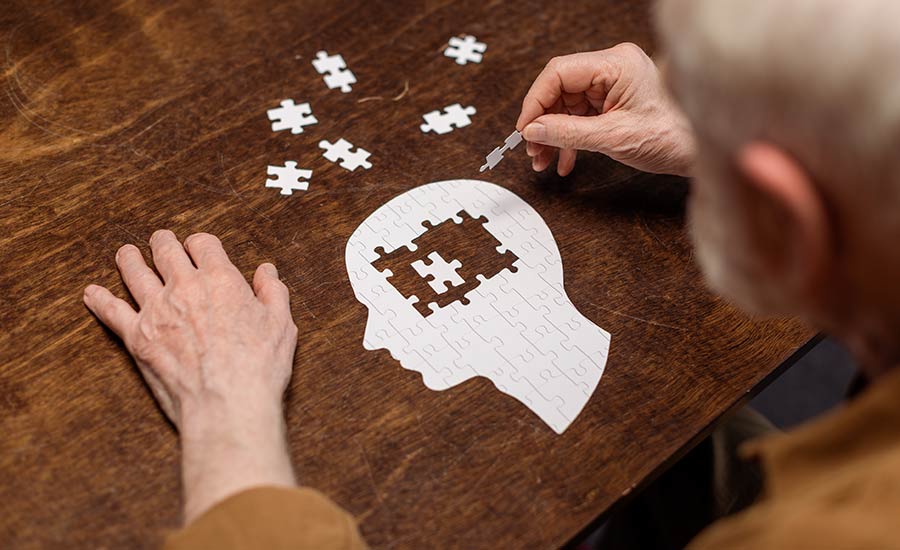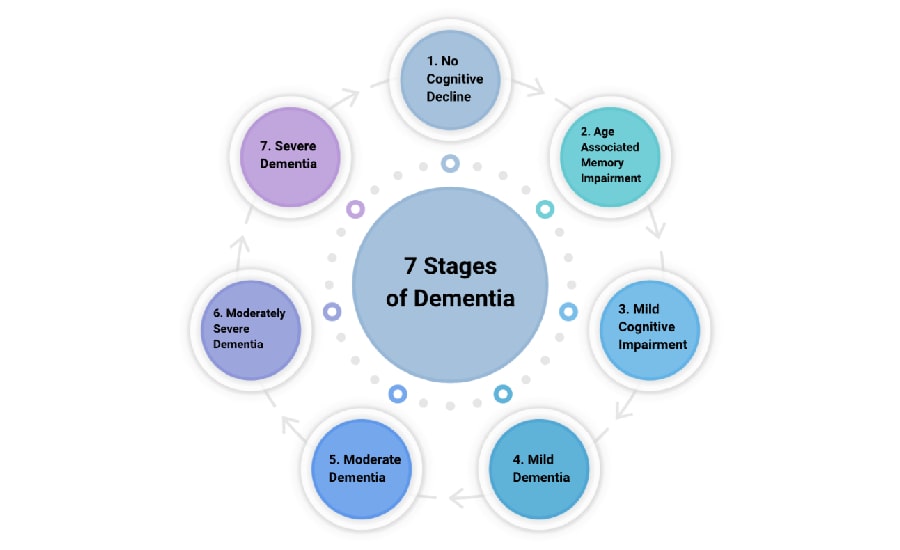The 7 Stages of Dementia Explained [Symptoms + FAQs]
![The 7 Stages of Dementia Explained [Symptoms + FAQs]](https://cdn.alwaysbestcare.com/wp-content/uploads/2023/08/7-stages-dementia-hero-image.jpg)
If you are caring for a loved one with dementia, understanding the progression of each stage can help you determine your loved one’s care needs. Each stage of dementia can be segmented into seven distinct, identifiable stages.
We’ll walk you through the seven stages of dementia, including symptoms to expect at each stage, and cover frequently asked questions about the condition. Plus, we’ll explain how our compassionate caregivers at Always Best Care Senior Services can help.
Table of Contents
What Is Dementia?
Dementia is a broad term for the decline of cognitive functions such as memory, attention, movement, language, and problem-solving skills, to a degree that it interferes with the individual’s daily life and activities.
Dementia occurs due to changes in the brain (abnormal buildups of amyloid proteins in the brain, for example) or the loss of or damage to the nerve cells in the brain.
Nerve cells can die because of pathological causes, including traumatic injury, environmental toxins, or cardiovascular disorders like coronary artery diseases.
Dementia is most common in patients over the age of 65, and the most common types of dementia include Alzheimer’s disease, vascular dementia, and Lewy body dementia.
What Are the Stages of Dementia?
Dementia progresses through distinct stages, starting with mild cognitive impairments and eventually leading to severe memory loss and physical decline in the final stages of dementia.
As the condition progresses, symptoms worsen from occasional forgetfulness to significant challenges in everyday function and communication.
The seven stages of dementia include:
Stage 1: No Cognitive Decline
The first stage of dementia is classified as the normal functioning phase, as the individual does not display any noticeable issues with memory or other cognitive impairment in this stage.
This stage of dementia can occur several months to several years before cognitive decline becomes evident.
Stage 2: Age Associated Memory Impairment
The second stage of dementia is classified as the very mild cognitive decline phase. In this stage, individuals can experience occasional memory lapses, such as forgetting familiar words or misplacing items.
While these forgetful moments could be mistaken for age-related memory changes, they are often the earliest signs of dementia. At this point, subtle signs are often missed by both clinical testing and the patient’s loved ones.
Stage 3: Mild Cognitive Impairment
The third stage of dementia is characterized by noticeable memory and cognitive issues. In this stage, individuals might struggle with organizing their thoughts or recalling recent events, like recent meals.
Other symptoms in this stage include:
- Difficulty finding the right word during conversations
- Forgetting names of new acquaintances or recently learned information
- Decreased ability to plan or organize events
At this point, mild cognitive impairment symptoms become more pronounced and can disrupt daily activities, often causing mild to moderate anxiety. This is the first stage in which individuals can speak with a healthcare professional to get an accurate diagnosis.
Stage 4: Mild Dementia
The fourth stage of dementia is characterized by more visible cognitive impairment that can impact daily life. In this stage, individuals may start to show changes in personality and mood.
Other symptoms in this stage include:
- Disorientation or the inability to correctly acknowledge the current time or place
- Difficulty concentrating on tasks or following multi-step instructions
- Difficulty recalling their personal history
- Difficulty recognizing familiar faces and individuals
Individuals at this stage will often avoid certain situations, such as attending social gatherings or making decisions, to hide symptoms of dementia or prevent stress or anxiety.
Stage 5: Moderate Dementia
The fifth stage of dementia is characterized by cognitive impairments that can mildly affect an individual’s ability to function independently.
In this stage, individuals may ask for help with making decisions. Their memory is affected, making it difficult for them to remember personal details, such as their current home address or phone number.
While this stage of dementia can affect cognitive abilities, individuals can typically still perform basic tasks, such as using the bathroom or eating without assistance.
Stage 6: Moderately Severe Dementia
The sixth stage of dementia is characterized by a drastic decline in cognitive function. In this stage, individuals require help performing daily activities, such as eating on their own or maintaining personal hygiene.
Other symptoms in this stage include:
- Incontinence
- Difficulty sleeping
- Lack of ability to recognize familiar faces, including children, siblings, and friends
- Anxiety, agitation, and aggression
- Auditory hallucinations (hearing sounds that aren’t there, like footsteps) or olfactory hallucinations (smelling things that aren’t there, like perfume or smoke)
Stage 7: Severe Dementia
The seventh stage of dementia is characterized by a severe decline in all cognitive and physical functions. In this final stage of dementia, individuals are dependent on their caregivers for their daily needs.
In addition, individuals during this final stage of dementia cannot verbally communicate and their physical abilities continue to deteriorate, eventually making them bedridden.
Other symptoms in this stage include:
- Muscle atrophy or the decrease of muscle mass, due to decreased mobility
- Difficulty in swallowing, due to a significant loss of muscle coordination
- Decrease in basic motor skills, such as the ability to sit up without support or even to smile

7 Stages of Dementia Chart
The seven stages of dementia chart below provides a clear roadmap of the progression of dementia. Understanding each stage allows you to anticipate and respond to the changes your loved one might experience throughout this condition.

How Is Each Stage of Dementia Determined?
Determining each stage of dementia requires a comprehensive assessment, which includes clinical observations, neuropsychological tests, imaging, and consultations.
To determine which stage a patient is in, a neurologist or geriatric psychiatrist:
- Collects the case history of the patient: The individual’s medical history provides insights into the onset, duration, and progression of dementia symptoms.
- Conducts a physical examination of the patient: A physical exam allows the healthcare provider to evaluate the patient’s overall health through vital signs, reflexes and coordination, and medication review.
- Performs a clock test: A clock test is an evaluation in which the patient draws a clock on a piece of paper and sets a specific time on it. This test allows healthcare providers to assess visual-spatial abilities, executive function, and attention to screen a patient for early stages of dementia.
- Performs magnetic resonance imaging (MRI) or a computed tomography (CT) brain scan: These non-invasive imaging procedures identify structural changes in the brain, such as atrophy (shrinkage), strokes, or tumors. Specific patterns of brain atrophy can be characteristic of different types of dementia. For example, in Alzheimer’s disease, the hippocampus (a region crucial for memory) often shows significant shrinkage during earlier stages.
To identify which stage of dementia the patient is in, the individual:
- Conducts a self-administered gerocognitive examination (SAGE test): A SAGE test is a brief, self-administered cognitive battery exam to evaluate the individual’s orientation, language, reasoning, memory, and visuospatial abilities. Once the test is completed, the answer sheet is taken to a neurologist or geriatric psychiatrist so they can score the test and talk to the patient about the results.
How To Care for Someone With Dementia
As a caregiver, learning about dementia can help you provide the best possible care tailored to your loved one’s needs.
To care for someone with dementia:
- Understand the condition: Consult with your loved one’s healthcare provider to familiarize yourself with the different stages and symptoms of dementia. Stay updated about the latest research, treatments, and interventions to provide optimal care.
- Create a safe environment: Follow a home safety checklist to remove potential hazards like loose rugs, clutter, or sharp objects that can cause accidents in your loved one’s home.
- Establish a routine: A daily routine can help dementia patients cope with short-term memory loss by engaging in activities that are familiar, reducing confusion and anxiety. Schedule regular daily activities for your loved one, such as eating, taking a bath, and going to sleep at the same time each day.
- Learn simple interaction techniques: Maintain eye contact and use a calm, gentle voice when communicating with your loved one. Use short, straightforward sentences and avoid overwhelming your loved one with too much information, as their cognitive understanding may be slower or more limited due to dementia.
- Provide emotional support: Offer reassurance for your loved one in moments of confusion or distress. A simple touch or holding hands can provide comfort.
- Celebrate small successes: Whether it’s remembering a family member’s name or simply sharing a smile, celebrating small wins can help both you and your loved one maintain a sense of positivity and connection.
- Join support groups: Find support in caregiver support groups, online forums, or counseling services to connect with individuals who understand your journey. Engaging with a community and sharing your challenges and wins can help reduce feelings of loneliness and caregiver burnout or resentment. Finding the support you need will help you as a caregiver, but also help ensure that you’re providing the best care possible to your loved one.

Get Help Caring for a Loved One With Dementia at Always Best Care Senior Services
Founded with a mission to alleviate the stress caregivers often face when seeking the best senior care, Always Best Care Senior Services is comprised of a team of professionals who combine their expertise with true compassion for those in their care.
Currently operating in over 225 locations, we offer dependable and trusted care for your loved one. Our commitment extends to bespoke services, ensuring that each care plan is meticulously tailored to cater to your loved one’s needs.
At Always Best Care, our services include:
- Respite care: We offer temporary care for your loved one to help you attend to other family responsibilities, manage personal errands, or simply take a break.
- In-home care services: We ensure your loved one receives comprehensive care within the familiar confines of their home, from continuous supervision to meal preparation and companionship.
- Skilled home health care: At select Always Best Care locations, we specialize in providing customized care solutions, ranging from personal care services to chronic disease management.
- Specialized home care: We take advantage of advanced technology and methods, including remote patient monitoring and personal emergency response systems, to keep a close eye on your loved one’s well-being.
- Senior living referral services: We help you choose the ideal assisted living community for your loved one, for encompassing emergency care, medical services, personal attention, housekeeping, and social activities.
- Veterans assistance program: We help veterans access financial resources for high-quality care, while ensuring they are treated with the utmost respect and consideration.
FAQs About Dementia
Still have questions we didn’t cover? Explore further details below about dementia.
1. What are the signs of dementia progressing?
As a progressive condition, dementia symptoms worsen over time. Symptoms of dementia progressing include:
- Wandering
- Memory loss
- Disorientation
- Difficulty sleeping
- Mobility issues, such as falls
- Worsening communication skills
- Personality and behavioral changes
2. Can a patient with dementia skip a stage?
No. A patient with dementia cannot skip a stage. All patients progress through all stages, where symptoms gradually worsen over time.
However, the manifestation of these symptoms can vary among individuals, and stages may not last the same amount of time for every patient.
3. Can dementia be cured?
No. While there is currently no cure for dementia, research shows that some medications can help manage symptoms associated with dementia, including donepezil, rivastigmine, galantamine, and memantine.
In addition, physical and behavioral therapies and cognitive stimulation and rehabilitation can also help manage symptoms.





